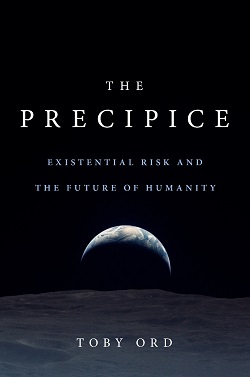The technological singularity—or simply the singularity—is a hypothetical future point in time at which technological growth becomes uncontrollable and irreversible, resulting in unforeseeable consequences for human civilization. According to the most popular version of the singularity hypothesis, I. J. Good's intelligence explosion model, an upgradable intelligent agent will eventually enter a positive feedback loop of self-improvement cycles, each new and more intelligent generation appearing more and more rapidly, causing a rapid increase ("explosion") in intelligence which ultimately results in a powerful superintelligence that qualitatively far surpasses all human intelligence.
Friendly artificial intelligence is hypothetical artificial general intelligence (AGI) that would have a positive (benign) effect on humanity or at least align with human interests or contribute to fostering the improvement of the human species. It is a part of the ethics of artificial intelligence and is closely related to machine ethics. While machine ethics is concerned with how an artificially intelligent agent should behave, friendly artificial intelligence research is focused on how to practically bring about this behavior and ensuring it is adequately constrained.

Nick Bostrom is a philosopher at the University of Oxford known for his work on existential risk, the anthropic principle, human enhancement ethics, whole brain emulation, superintelligence risks, and the reversal test. He was the founding director of the Future of Humanity Institute at Oxford University.
Artificial general intelligence (AGI) is a type of artificial intelligence (AI) that can perform as well or better than humans on a wide range of cognitive tasks. This is in contrast to narrow AI, which is designed for specific tasks. AGI is considered one of various definitions of strong AI.
A superintelligence is a hypothetical agent that possesses intelligence far surpassing that of the brightest and most gifted human minds. "Superintelligence" may also refer to a property of problem-solving systems whether or not these high-level intellectual competencies are embodied in agents that act in the world. A superintelligence may or may not be created by an intelligence explosion and associated with a technological singularity.

An AI takeover is a scenario in which artificial intelligence (AI) becomes the dominant form of intelligence on Earth, as computer programs or robots effectively take control of the planet away from the human species. Possible scenarios include replacement of the entire human workforce due to automation, takeover by a superintelligent AI, and the popular notion of a robot uprising. Stories of AI takeovers are popular throughout science fiction. Some public figures, such as Stephen Hawking and Elon Musk, have advocated research into precautionary measures to ensure future superintelligent machines remain under human control.
The Great Filter is the idea that, in the development of life from the earliest stages of abiogenesis to reaching the highest levels of development on the Kardashev scale, there is a barrier to development that makes detectable extraterrestrial life exceedingly rare. The Great Filter is one possible resolution of the Fermi paradox.

Human extinction is the hypothetical end of the human species, either by population decline due to extraneous natural causes, such as an asteroid impact or large-scale volcanism, or via anthropogenic destruction (self-extinction), for example by sub-replacement fertility.

Anders Sandberg is a Swedish researcher, futurist and transhumanist. He holds a PhD in computational neuroscience from Stockholm University, and is a former senior research fellow at the Future of Humanity Institute at the University of Oxford.
Differential technological development is a strategy of technology governance aiming to decrease risks from emerging technologies by influencing the sequence in which they are developed. On this strategy, societies would strive to delay the development of harmful technologies and their applications, while accelerating the development of beneficial technologies, especially those that offer protection against the harmful ones.

A global catastrophic risk or a doomsday scenario is a hypothetical event that could damage human well-being on a global scale, even endangering or destroying modern civilization. An event that could cause human extinction or permanently and drastically curtail humanity's existence or potential is known as an "existential risk."
In futurology, a singleton is a hypothetical world order in which there is a single decision-making agency at the highest level, capable of exerting effective control over its domain, and permanently preventing both internal and external threats to its supremacy. The term was first defined by Nick Bostrom.

Toby David Godfrey Ord is an Australian philosopher. In 2009 he founded Giving What We Can, an international society whose members pledge to donate at least 10% of their income to effective charities, and is a key figure in the effective altruism movement, which promotes using reason and evidence to help the lives of others as much as possible.

The Future of Life Institute (FLI) is a nonprofit organization which aims to steer transformative technology towards benefiting life and away from large-scale risks, with a focus on existential risk from advanced artificial intelligence (AI). FLI's work includes grantmaking, educational outreach, and advocacy within the United Nations, United States government, and European Union institutions.

Superintelligence: Paths, Dangers, Strategies is a 2014 book by the philosopher Nick Bostrom. It explores how superintelligence could be created and what its features and motivations might be. It argues that superintelligence, if created, would be difficult to control, and that it could take over the world in order to accomplish its goals. The book also presents strategies to help make superintelligences whose goals benefit humanity. It was particularly influential for raising concerns about existential risk from artificial intelligence.
Existential risk from artificial general intelligence is the idea that substantial progress in artificial general intelligence (AGI) could result in human extinction or an irreversible global catastrophe.

Global Catastrophic Risks is a 2008 non-fiction book edited by philosopher Nick Bostrom and astronomer Milan M. Ćirković. The book is a collection of essays from 26 academics written about various global catastrophic and existential risks.

The Precipice: Existential Risk and the Future of Humanity is a 2020 non-fiction book by the Australian philosopher Toby Ord, a senior research fellow at the Future of Humanity Institute in Oxford. It argues that humanity faces unprecedented risks over the next few centuries and examines the moral significance of safeguarding humanity's future.

Longtermism is the ethical view that positively influencing the long-term future is a key moral priority of our time. It is an important concept in effective altruism and serves as a primary motivation for efforts that claim to reduce existential risks to humanity.

Scenarios in which a global catastrophic risk creates harm have been widely discussed. Some sources of catastrophic risk are anthropogenic, such as global warming, environmental degradation, and nuclear war. Others are non-anthropogenic or natural, such as meteor impacts or supervolcanoes. The impact of these scenarios can vary widely, depending on the cause and the severity of the event, ranging from temporary economic disruption to human extinction. Many societal collapses have already happened throughout human history.












